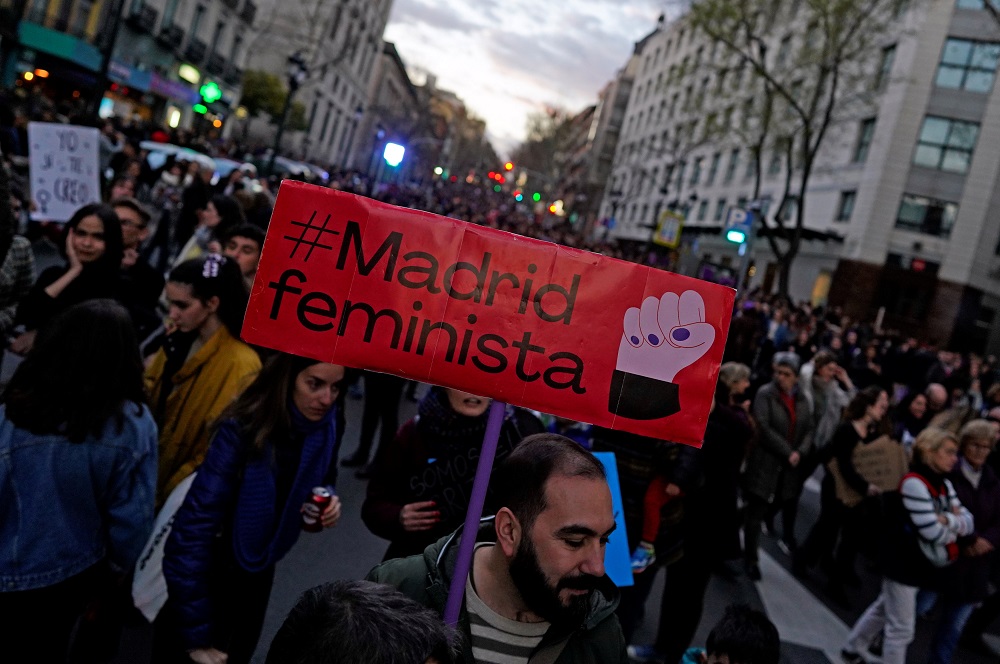MADRID, March 9 — Spain marked International Women’s Day yesterday with a strike and hundreds of thousands taking to the streets calling for equality, in what has become a hot topic ahead of next month’s election.
Organised by Spain’s two largest unions CCOO and UGT, the two-hour work stoppage was observed by more than six million people nationwide, according to UGT. Other smaller unions called for a 24-hour strike.
In the northern Basque Country, the regional parliament was forced to suspend a session as most female lawmakers didn’t show up for work.
Nuns, prominent journalists and Madrid Mayor Manuela Carmena had pledged to take part, with the aim of recreating an unprecedented two-hour work stoppage that took place on the same day in 2018.
Authorities said over half a million people took part in protests across the country, with some 350,000 people estimated to have taken part in Madrid and another 200,000 in Barcelona. Thousands also marched in other cities, including Seville and Bilbao.
“Things haven’t changed much,” said Amelia Leon, a 69-year-old retiree who was marching with two retiree friends in Barcelona.
“When I worked as a manager in a pharmaceutical laboratory, the men who were two categories below me earned more than me. And it’s still happening in many places.”
In Madrid, fountains along the city centre protest route were lit purple, the colour long associated with efforts to achieve gender equality.
“I’m mobilising above all for what is missing to achieve equality,” said Clara Lopez, 29, her face painted in purple, highlighting the lack of women in high-level executive positions.
‘Feminist Spain’
With snap elections looming on April 28, women’s rights have become a major theme for both the left and right, with everyone pledging a fight against inequality.
European Union figures show the gender pay gap in Spain stands at 14.2 per cent, two points below the bloc’s average.
And gender violence continues to extract a deadly toll, with 47 women killed by their partners or ex-partners last year — bringing to 975 the number female victims since 2003, according to government figures.
Prime Minister Pedro Sanchez, who has made women’s rights one of the central themes of his campaign, said he wanted “a feminist Spain”.
“Only with feminism will we end violence against women and achieve real equality,” he wrote on Twitter.
Even the national police weighed in, saying Thursday it was working on a “non-sexist language guide” for its officers.
Backlash
But there were also an increasing number of dissenting voices, with the conservative Popular Party accusing the left of appropriating feminism to get more votes.
In Madrid, Carmen Cibiriain, a 71-year-old retiree, said the issue was being used for politicians’ own ends.
“When I hear them say that feminism is liberal, or that it’s anti-capitalist, it isn’t. It’s equality,” she said.
The far-right has pledged to make the fight against “radical feminism” a priority.
And the deeply-conservative “Women of the World Global Platform,” a Spanish initiative which groups like-minded associations from around the world, has called its own rally in Madrid tomorrow.
The aim, according to its website, is to “affirm femininity, the value of motherhood and dedication to the family and... to show our sincere affection, admiration and gratitude to our dear men”.
Another ultra-conservative association has been driving around in a bus emblazoned with the slogan “#StopFeminazis” and a picture of Hitler in pink lipstick.
Anna Bosch, a journalist at Spain’s TVE state television — which did not air several Friday programmes due to the strike — said women had mobilised en masse last year following a series of controversial court cases.
One involved the sentencing of five men who were accused of gang-raping a teenager in 2016 for sexual abuse rather than rape.
What had motivated women this year, was the rise in prominence of “positions that are clearly backward”, she told AFP. — AFP






















